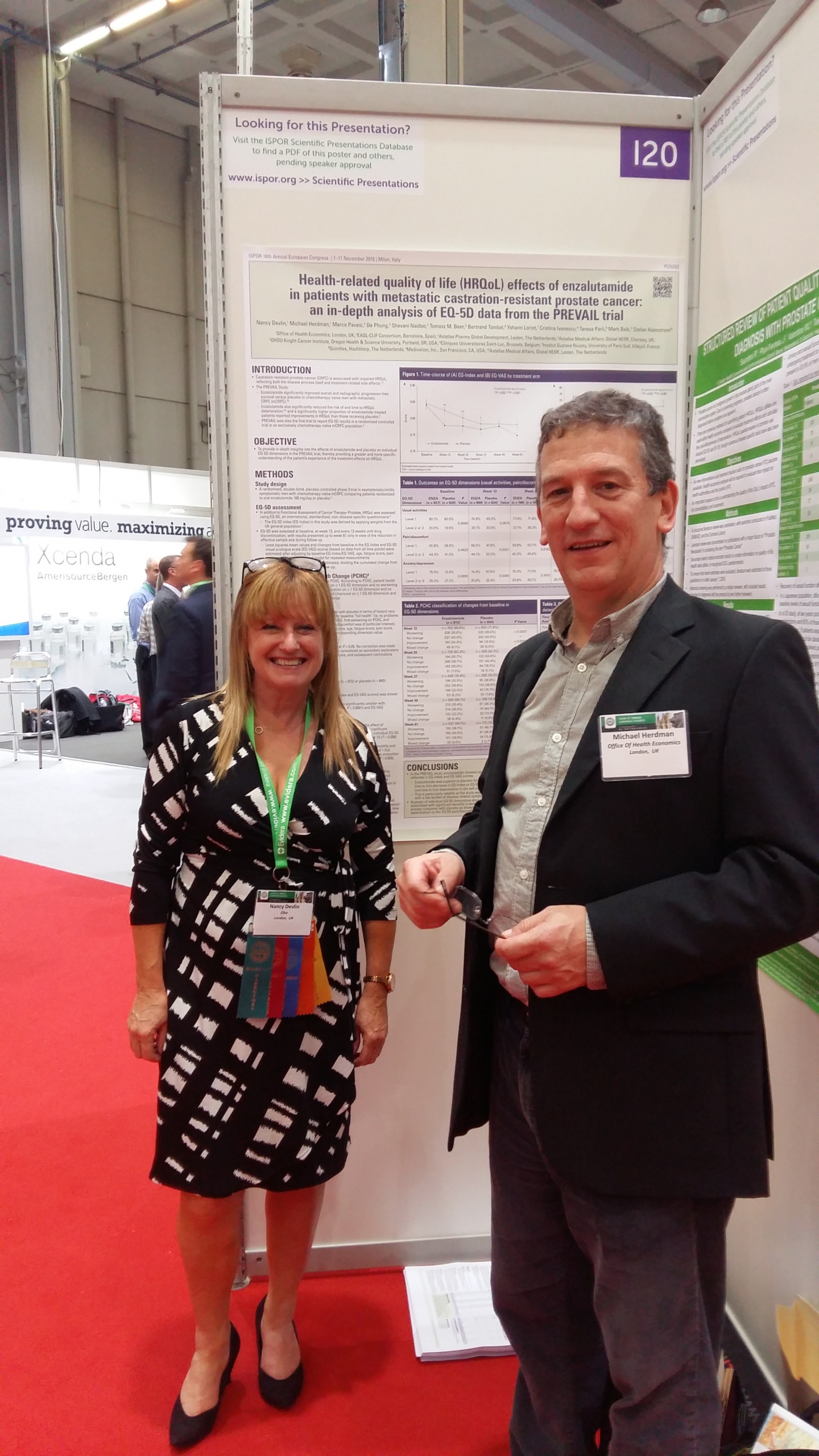Sign up to our newsletter Subscribe
Analysing Global Immunisation Expenditure

Sign up to our newsletter Subscribe


A summary of OHE’s presentations and contributions at ISPOR Europe, Milan 2015. The ISPOR 18th Annual European Congress was held in Milan, Italy, 7-11 November 2015. OHE’s Director of Research, Nancy Devlin, participated in the Third Plenary and a Workshop…

A summary of OHE’s presentations and contributions at ISPOR Europe, Milan 2015.
The ISPOR 18th Annual European Congress was held in Milan, Italy, 7-11 November 2015. OHE’s Director of Research, Nancy Devlin, participated in the Third Plenary and a Workshop and presented two posters, whilst Director Adrian Towse had the honour of presenting ISPOR’s 2015 Donabedian Award to Tony Culyer. This post contains presentations and posters relating to Adrian and Nancy’s contributions to the ISPOR conference.
Presentation of the Donebedian Award to Tony Culyer
The ISPOR Avedis Donabedian Outcomes Research Lifetime Achievement Award acknowledges individuals who have made a major contribution to the improvement of health outcomes. The 2015 Award was to Tony Culyer. Adrian made the presentation speech, covering briefly Tony’s contribution to: health economics thinking; teaching and advising; academic institutions; and public policy making. This included comments on: his role in reorganising NHS R&D, and in setting up NICE; his theoretical contribution to extra-welfarism, and to the understanding of what is meant by equity and need; and his thinking on deliberative decision making.
Access Adrian’s speech here.
To view Tony Culyer’s response, click here.
Plenary session: Recommendations from the ISPOR Multi-Criteria Decision Analysis Emerging Good Practice Task Force and Remaining Controversies
In this session, the panellists discussed the good practice recommendations of the ISPOR MCDA Task Force Report. As one of the Task Force Co-chairs, Nancy responded to comments from Brett Hauber and Mónica Duarte Oliveira. Nancy’s presentation slides are below.
Those of the other panellists (Maarten Ijzerman, Kevin Marsh, Brett Hauber and Mónica Duarte Oliveira) can be accessed here.
Workshop: Utilities in HTA: Challenges for Theory and Practice Now and in the Future.
Nancy, along with Mike Drummond and Jenny Berg, ran a Workshop to discuss methodological and practical challenges regarding generation and use of utility data in HTA. Nancy presented on “Theoretical foundations and challenges” arguing that the researchers’ choices made about which methods to use in eliciting and modelling stated preference data can have an important impact on the utilities used in HTA – and QALY estimates and therefore on resource allocation. In her presentation, Nancy examined the extent to which the theory of extra welfarism, which underpins QALY-based HTA systems, provides guidance on which methods to use in establishing utilities. Nancy’s presentation slides are below.
Those of the Mike Drummond and Jenny Berg can be accessed here.
Two poster presentations
Nancy also presented two posters, one with OHE’s Health of Outcomes Mike Herdman. The abstracts are set out below.
Poster presentation: Health-related Quality of Life (HRQoL) Benefits of Enzalutamide in Patients with Metastatic Castration-resistant Prostate Cancer (MCRPC): an In-depth Analysis of EQ-5D Data from the Prevail Trial.
Devlin N, Herdman M, Pavesi M, Phung D, Naidoo S, Beer TM, Tombal B, Loriot Y, Ivanescu C, Parli T, Balk M, Holmstrom S.

OHE’s Nancy Devlin and Mike Herdman presented a poster based on their analysis of EQ-5D data from a clinical trial of enzalutamide, examining the effects on health-related quality of life (HRQoL) in the PREVAIL trial in chemotherapy-naïve men with metastatic castration-resistant prostate cancer (mCRPC). Patients received oral enzalutamide 160 mg/day (n=872) or placebo (n=845). EQ-5D Index and EQ-5D visual analogue scale (VAS) scores were evaluated at baseline, Week 13 and every 12 weeks until drug discontinuation. Changes on individual dimensions were assessed, and Paretian Classification of Health Change (PCHC) – a method developed by Nancy to examine dimension-level changes in patients’ self-reported health (Devlin, Parkin and Browne 2010) and time-to-event analyses conducted. Results showed that with enzalutamide, EQ-Index and VAS scores declined more slowly versus placebo and time to diverge from full health was prolonged. Average decline in EQ-Index (-0.042 versus -0.070, p<0.0001) and EQ-VAS (-1.3 versus -4.4, p<0.0001) was significantly smaller with enzalutamide. There were significant (p<0.05) between-group differences in favour of enzalutamide in Pain/Discomfort dimension through to Week 37, Anxiety/Depression at Week 13 and Usual Activities at Week 25 but no significant differences for Mobility and Self-care. PCHC analysis showed a greater proportion of enzalutamide patients reporting improvement versus placebo at Weeks 13, 25 and 49 (all p<0.05) and at Week 37 (p=0.0512). Enzalutamide was superior (p<0.001) to placebo for time to diverge from full health and time to first deterioration on Pain/Discomfort and Anxiety/Depression dimensions.
The study concluded that, compared with placebo, in addition to delaying HRQoL deterioration, enzalutamide had beneficial effects on several HRQoL domains, including Pain/discomfort, and the proportion of patients in full health.
Poster presentation: Qualitative Interviews to Provide In-depth Understanding of the Impact of Non-small Cell Lung Cancer (NSCLC) and its Treatment on of the Lives of Patients and their Families/Caregivers.
Mulatero C, Lal R, Jewitt K, Tolley C, Wells J, Arbuckle R, Lloyd A, Brazier J, Devlin N.
The aim of this study was to better understand the impact of advanced NSCLC and its treatment on the quality of life and lived experience of patients, in order to inform the optimal design and inclusion of outcome assessments in clinical trials. Face-to-face, qualitative, semi-structured interviews were conducted with 20 UK participants with advanced NSCLC. Interviews explored participants’ experiences of NSCLC and the treatment and care they received. Open-ended questioning, to facilitate spontaneous reporting, was followed by focused questions to further investigate important themes. Verbatim transcripts were analyzed using a data-driven, thematic analysis. Participants experienced considerable burden from symptoms and treatment-related side effects (e.g. breathlessness, nausea), which left them unable to participate in activities of daily living such as housework, shopping or going outside. However, participants reported that it was the emotional impact on them and their families (e.g. worry, sadness and frustration) that had the biggest negative impact on their lives. Almost all participants were highly satisfied with their treatment and care, but time lost to receiving and recovering from treatment was a commonly reported negative impact. Efficiency, communication and practical and emotional support were aspects of care valued most by participants. The majority of participants (11/16 asked) said they would prioritise improving quality of life over extending life. The study concluded that advanced NSCLC impacts many domains of participants’ lives. This study demonstrates that emotional impact and time taken undergoing treatment may be undervalued by the commonly employed HRQoL metrics in clinical trials. Future clinical trials of new lung cancer treatments should include assessment of these outcome measures and tools to satisfactorily capture all factors deemed important by patients should be developed to fully reflect impact of new treatments on HRQoL on patients.
An error has occurred, please try again later.
This website uses cookies so that we can provide you with the best user experience possible. Cookie information is stored in your browser and performs functions such as recognising you when you return to our website and helping our team to understand which sections of the website you find most interesting and useful.
Strictly Necessary Cookie should be enabled at all times so that we can save your preferences for cookie settings.
If you disable this cookie, we will not be able to save your preferences. This means that every time you visit this website you will need to enable or disable cookies again.
This website uses Google Analytics to collect anonymous information such as the number of visitors to the site, and the most popular pages.
Keeping this cookie enabled helps us to improve our website.
Please enable Strictly Necessary Cookies first so that we can save your preferences!



